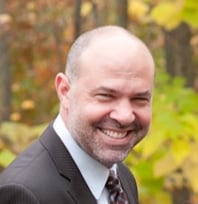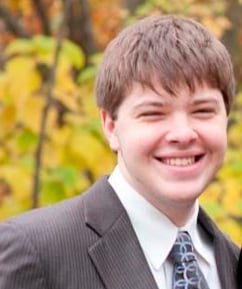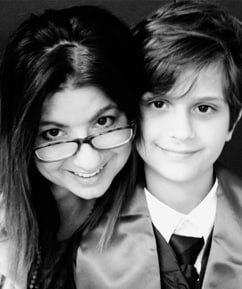Family Stories

It has been just over one year since I was diagnosed with Stage IIIb colorectal cancer, due to a well-characterized mutation in MSH2, one of the genes involved in Lynch syndrome. The last 11 months have been a roller coaster, emotionally and physically. The hardest part was accepting that I could have potentially prevented my cancer (or at least skipped chemotherapy) if I had chosen to undergo genetic testing five years ago.
As a graduate student in Human Genetics, I suspected that my family harbored a mutation in a hereditary cancer gene, as five of my maternal relatives had been diagnosed with various cancers–three before their 40th birthdays. I searched for a genetic link, scouring pamphlets from genetic counselors. Nothing made sense–until several years later, when one of my family members was diagnosed with a well-characterized mutation in MSH2. As a geneticist, I assumed that if I were given an opportunity to be diagnosed through genetic testing, I would enthusiastically find out the answer. However, when presented with the possibility of knowing if I had a mutation in MSH2, I did nothing. I rationalized that it couldn’t happen to me. Even as someone who understands genetics and champions genetic testing, I failed to be realistic about my 50% chance of inheriting our family’s MSH2 mutation.
Three days after my 47th birthday, I found what felt like a heel in my lower right abdomen. After a panel of tests and a colonoscopy, I heard words I will never forget, “You have Stage III colorectal cancer.” The next weeks blurred, as I discovered I carried my family’s MSH2 mutation, as I sorted through this devastating news, as my life changed permanently. Yet, I am one of the lucky ones. I was accepted into a clinic devoted to Lynch syndrome, and my surgery was a great success. I finished six months of chemotherapy, complete with severe cold sensitivity, neuropathy, and days in which my brain functioned 50% slower than normal. In addition, I had my reproductive organs removed, as my MSH2 mutation increased my chances of having uterine and ovarian cancers.
Looking back over the last year, I am grateful to have found my tumor before it metastasized, grateful for everyone who helped me make it through the diagnosis, surgery and chemotherapy, and grateful for encouraging words on my worst days. The love that came my way over the past year is the best gift I have ever been given. In this post-cancer life, I became proactive regarding my health care, urged my brothers to take preventative measures and used social media to advocate for Lynch Syndrome prevention, diagnosis and treatment. It is my way to combat this cancer so I can share the gifts I have been given this past year, so that maybe others will choose to undergo genetic testing before they hear those devastating words.

My name is David, and I am a Lynch syndrome survivor. Since 1997, I’ve had three tumors, undergone seven surgeries, and chemotherapy—so I’m very much a survivor in just about every sense of the word.
One of the biggest hurdles is the misconception that colon cancer is an old man’s disease, understanding that affects younger men and it affects women. At 28, I had the traditional symptoms of colon cancer: cramping and bleeding, I was lethargic and was losing weight. So I went for a checkup to figure out what was going on and, like many people who are young with symptoms, was misdiagnosed—first the traditional, “it’s just an ulcer” or stress-related. After couple months when my symptoms didn’t go away, I went back in. Finding out you have cancer at a young age is really like getting hit in the face. You’re going from being indestructible to being incredibly vulnerable in a matter of minutes. However, given the family history of grandfather and father before me and having it literally written there on the chart that there is a family history of colon cancer did not make it as much of a shock as it probably would be for others. When colon cancer round two came, that’s where it really started setting off the bells and whistles, because it had been barely a year since my previous colonoscopy, and to go from having nothing to having a malignant tumor growing really changed things. I had genetic testing done and that’s when it came out that I had Lynch syndrome. The nice thing about genetic testing is that it’s really very easy. It’s literally a blood test, in some cases it’s even saliva, and it is taken by your primary physician or your specialist with results coming back in a matter of weeks, if not sooner.
I know I was hoping for something different to come out of the gene pool, but this is what I’ve been given. My oldest son has been screened and he does have the genetic predisposition—so far he’s fine—but I do have two younger sons as well. My wife is involved to ensure continuity—someday if I’m gone she’s going to be managing the boys and everything that goes along with it. So from that perspective it’s tough. But from a longevity standpoint, we have a lot to be positive about. My grandfather, although he had colon cancer in his 60s, died late of Alzheimer’s disease; my father, who had colon cancer in his 40s, is now 83; and my older brother Greg, who had cancer at 37, is now 53. So while it’s getting younger, we’re all still sticking around for a while.
It’s absolutely worth getting screened early, especially for colon cancer where it may not necessarily be preventable but it’s treatable. In terms of advice, I would tell people to not only talk with the doctor, but talk with your family, finding out what they know and what they may not know and having that conversation about history and seeing if maybe they should be doing something further to check themselves. Setting aside a time is important. Whenever there is a family get together, make it a priority to have that conversation, have your material ready, and don’t let it go because you’re talking about real issues. You’ve got to be persistent and you have to understand that you may not get the results that you want from everybody. In the social media world I see a lot of people who have been diagnosed with a form of cancer, usually colon cancer, and sometimes they have not gone for genetic testing. There are other people who may have Lynch syndrome or may have not been tested for Lynch syndrome and all they’re getting is an annual colonoscopy and that’s just not sufficient.

I recently got genetically tested, and I tested positive for Lynch syndrome which runs in the family. The way I described it was it was like you’re about to jump into a pool and you know it’s going to be really cold when you jump in, but it’s still a shock. If you do the math, my great-grandfather had colon cancer, my grandfather and my father and uncle, so while that helps prepare me for the news that I had Lynch it’s still a very big eye-opener. Better safe than sorry–worst-case scenario is if I get tested is I can prepare better for the future, and best case scenario is I know I’m in the clear and don’t have to worry about anything. If I didn’t get tested really it just leaves everything in the air and this is a lot more unknowns. I had to deal with this, had to get tested and start taking cautionary steps to help prevent any cancer in the future.
I got my first colonoscopy over the summer which wasn’t fun at all but it’s a necessary evil. It’s stressful but necessary to have to deal with–it’s stuff like that that’s tolerable. People should recognize everything that they can to help be preventative and to just take care of themselves, like eating healthy and being active– all that is important for any normal healthy person but even more so when you know that you have this this condition.
The best thing I could have done for myself is get checked. Making sure you know what’s coming your way is the most important thing that you can do. The cons from knowing this at such a young age are completely blown away by all the benefits.

I want you to know that I am grateful every single day of my life that I do not have cancer. However, I am writing this to let you know that for some women, having their ovaries removed is not a cakewalk. I was extremely unprepared and felt very alone – I am writing this so you feel neither.
My strong family history of early onset colorectal cancer prompted me to seek out genetic counseling and genetic testing, although I was healthy and cancer-free. At the age of 40, I tested positive for Lynch syndrome, a hereditary cancer syndrome that makes it more likely that I will get colorectal and other cancers, including uterine (endometrial) and ovarian cancer. The words “ovarian cancer” are two of the scariest words for any woman to hear. Screening for ovarian cancer at this time is poor and usually by the time it is discovered, it is too late. Current recommendations for women with Lynch syndrome do not agree on one course of action, and the evidence is limited on which option results in better outcomes. Other women might choose to have more intense and more frequent screenings. I opted for surgery to remove my ovaries and uterus. I was 9 years old when my mother died, and the thought of leaving my 12-year-old son motherless horrified me.
Ovaries are not just for reproduction. The estrogen they create protects the heart and bones, prevents many forms of cancer from developing, and is necessary for high cognitive functioning. Estrogen also impacts skin elasticity, libido, and mood. The removal of my ovaries would have enormous psychological and physical implications for me and would impact how I view myself. The moment I awoke from my surgery, I found myself in the abyss of forced menopausal hell. With the passage of time and decreasing estrogen levels, my situation worsened. Two months following my surgery, I found myself on a downward spiral into a very dark and frightening place. I found myself becoming more introverted, quiet, and disconnected from things, people, and many of my passions. What I struggled with the most was the decline of my maternal instinct: I had to make a concerted effort to continue my role as a mother.
Fortunately, the passage of time, combined with a dedicated doctor, helped improve many of the negative side effects of my hysterectomy and oophorectomy. I was fortunate to find a doctor who understood the importance of using hormone replacement therapy that is specific for each individual. The psychological and psychiatric interventions I received were also helpful. While I do feel better, I will never be the same woman. While researching Lynch syndrome and other hereditary cancer syndromes, I noticed tremendous symmetry between them. Although the mutations may be different, the psychological and some physical aspects of hereditary cancers share more parallels than disparities. After speaking with many other women who have undergone prophylactic oophorectomy, I have discovered that I am not alone. We may have prevented the potential development of ovarian cancer, but at a huge cost. Removing body parts holds implications for the emotional and psychological aspects of one’s being. Still, after reading a great deal about ovarian cancer, I am confident I made the right decision.